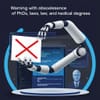Google's AI pioneer, Jad Tarifi, is warning that traditional degrees like PhDs, law, and medicine might become obsolete in the AI era. Tarifi, who co-founded Google's first generative AI team, believes that the rapid advancements in AI will make these lengthy educational programs less relevant.
The concern is that by the time students finish a PhD or a long professional degree, the technology landscape may have changed entirely, making the skills they've learned outdated. Medical education, for instance, relies heavily on memorization, and what students learn today might be obsolete in a few years.
AI-assisted diagnostics, robotic surgeries, and automated administrative tasks are changing the healthcare landscape, potentially making some traditional medical skills less valuable. The ability to adapt quickly to new technologies and situations will become crucial in the AI era.
Developing emotional intelligence, empathy, and social skills will be essential for working effectively with AI systems. Focusing on practical skills, such as AI literacy and real-world experience, will be more valuable than traditional academic credentials.
To future-proof your career, it's essential to focus on human skills like empathy, emotional awareness, and social interaction, which will become more valuable as AI handles routine tasks. Keeping up-to-date with AI applications in your field can provide a competitive edge, and being open to continuous learning and professional development will be essential for staying relevant in the AI era.
As AI continues to advance, it's crucial to rethink traditional educational models and focus on developing skills that complement AI systems. By doing so, individuals can stay ahead of the curve and thrive in an AI-driven world.


